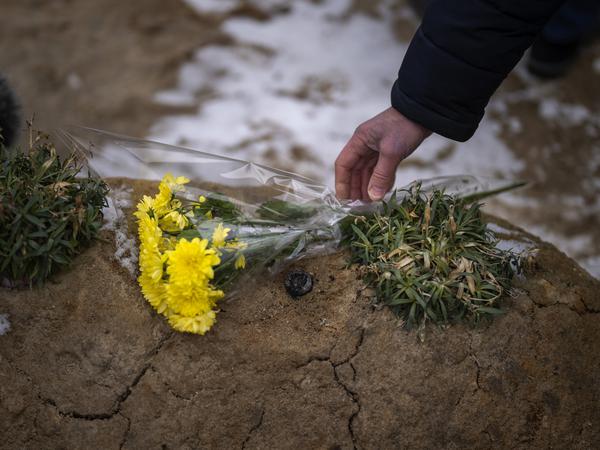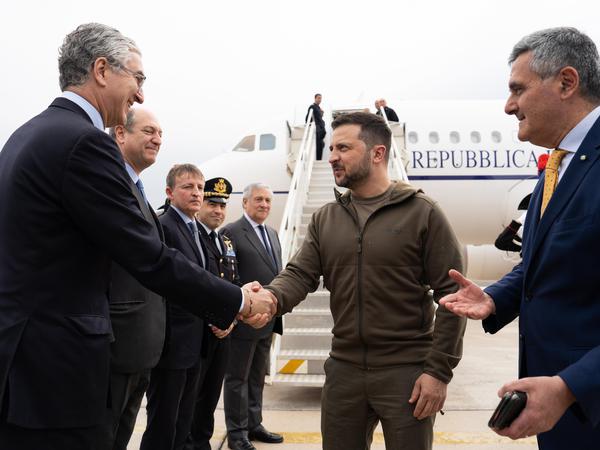Empathy and admiration, fears and distrust: Hardly anyone in the past 15 months has plunged Germans into such a roller coaster of conflicting emotions as this year’s Charlemagne Prize winner: Ukrainian President Volodymyr Zelenskyj.
When Vladimir Putin started the war at the end of February 2022, people in this country trembled and suffered with the Ukrainians. They admired the courage and defiance of their head of state. “I need ammunition, not a ride,” Zelenskyy replied to the US offer to take him safely out of the country.
He puts the responsibility for his fellow citizens above his own life. This is also one of the reasons for being awarded the Charlemagne Prize this Sunday.
From 5000 steel helmets to main battle tanks
At the same time, the federal government decides on the next major delivery of weapons: tanks, air defense, artillery, ammunition. What a contrast to the 5,000 steel helmets that Berlin sent at the beginning of the war as a “very clear signal” of support – which made it a laughingstock.
The war changed the Germans, forced a change of ministers from Christine Lambrecht to Boris Pistorius. At first, many felt uneasy about the question of which practical actions should follow from compassion. The Chancellor’s speech at a turning point and arms deliveries: are we becoming a war party, risking an escalation of fighting in NATO territory or an escalation to nuclear war?
People reacted with similar anxiety to the sanctions and the exit from Russian gas and oil: can Germany hold out? Are we losing jobs and wealth? Do we have to endure cold apartments and electricity rationing as if we were at war ourselves?
Horror at Bucha and other war crimes
Moods changed as the war progressed. Hope: The Ukrainians brought Putin’s offensive to a halt, successfully defended their capital, Kiev, and pushed back the occupying forces.

Horror: In Bucha and other liberated places, the Russian soldiers had committed war crimes. They weren’t isolated cases, that became increasingly clear. Action against civilians was part of Russian warfare, as it had been in Chechnya or Syria before.
For Germans who saw a partner in Russia, a world collapsed. Those who warned of Putin’s sinister intentions decried her as a warmonger. But Putin’s soldiers fired on nuclear power plants in Chernobyl and Zaporizhia, risking a meltdown. The Kremlin has repeatedly threatened to use nuclear weapons.
Zelenskyj puts Ukraine on the map of Europe
Zelenskyj in an olive green outfit and his annoying ambassador Andriy Melnyk became daily reminders in newspapers, TV stations and social networks. The Germans saw him there almost more often than their chancellor. He put Ukraine, previously a no man’s land, on the political map of Europe.

He challenged the Germans to take a fresh look at their historical responsibility. The practiced arguments got an unexpected downside. Given the attack on the Soviet Union in 1941, is Germany allowed to deliver weapons that kill Russians today?
In addition to this objection, there was a counter-objection: May Germany refuse arms aid to the Ukraine? The horrors of the world war had raged there, the extermination camps were there. Ukraine had lost a far larger part of the population than Russia. Suddenly, Russia was no longer synonymous with Soviet casualties.
Relief: Germany survives the winter
The experience of 15 months of war did not dispel the fears, but reduced them. Germany survived the winter without a heating or power failure. Willingness to support Ukraine remains high.
Many Germans instinctively understand that Zelenskyy and the Ukrainians are also defending German values and interests with their struggle and their sacrifices. Of course, it hasn’t made them immune to Putin’s threats or his playing with German fears.
The inner-German dispute continues: Are we doing enough? Or too much? Does arms aid make sense because it allows Ukraine to retake territory and improve its negotiating position? Or does it only lead to more victims and also increase the risk of escalation?
Of course, the Germans and their government must weigh the pros and cons of the support Zelenskyy is demanding in Berlin and Aachen. But keep one thing in mind and heart: Given the role Germans have played in Central and Eastern Europe, no one there awaits their advice on what losses Ukraine should accept in order to end the war.
The historical experience of the eastern neighbors is that when Germans and Russians have come to an agreement over their heads, it usually ends badly for those affected. Selenskyj is polite enough not to say so openly in Aachen. The Germans have to find their own role: help, not preach.
